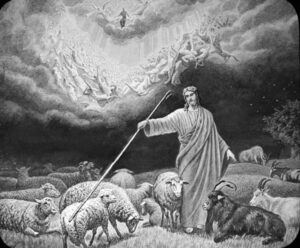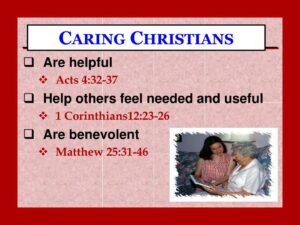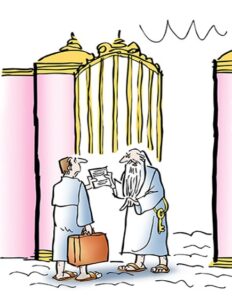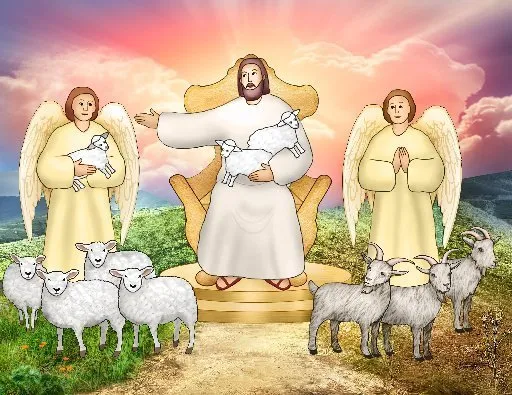Another View of the Judgment
 Another View of the Judgment
Another View of the Judgment
In the last post we took an initial view of what it might be like to preach about the coming judgment. In this post we’ll look at another view of judgment that could be very enriching for your congregation. The passage that I have in mind are these verses from Matthew 25:
31 “When the Son of Man comes in his glory, and all the angels with him, he will sit on his glorious throne. 32 All the nations will be gathered before him, and he will separate the people one from another as a shepherd separates the sheep from the goats. 33 He will put the sheep on his right and the goats on his left.
34 “Then the King will say to those on his right, ‘Come, you who are blessed by my Father; take your inheritance, the kingdom prepared for you since the creation of the world. 35 For I was hungry and you gave me something to eat, I was thirsty and you gave me something to drink, I was a stranger and you invited me in, 36 I needed clothes and you clothed me, I was sick and you looked after me, I was in prison and you came to visit me.’
37 “Then the righteous will answer him, ‘Lord, when did we see you hungry and feed you, or thirsty and give you something to drink? 38 When did we see you a stranger and invite you in, or needing clothes and clothe you?39 When did we see you sick or in prison and go to visit you?’
Is Judgment On the Basis of Works?
 It seems that way, doesn’t it? It seems that the sheep that go to heaven are those who have done these things. The next verses say that the goats, who are consigned to hell, don’t do these things. So, in another view of the judgment do we assume that we have to look at our good works on a scale to see if they outweigh all our bad deeds, thoughts, and failures?
It seems that way, doesn’t it? It seems that the sheep that go to heaven are those who have done these things. The next verses say that the goats, who are consigned to hell, don’t do these things. So, in another view of the judgment do we assume that we have to look at our good works on a scale to see if they outweigh all our bad deeds, thoughts, and failures?
Obviously, that is not what this passage is about. So, what does it mean? I said in the last post that salvation is by grace–we can’t earn it. So, what does this mean? I asked Chat GPT what Jesus meant in saying this. To my surprise, here is the answer I got back, in part:
-
The “sheep” are those who showed love and mercy to others—feeding the hungry, clothing the naked, visiting the sick and imprisoned.
-
These acts are not the cause of salvation but the evidence of a transformed heart. Genuine faith expresses itself in tangible love (cf. James 2:14–17).
-
Heaven is pictured as an inheritance—a gift, not something earned. It was “prepared from the foundation of the world,” pointing to God’s eternal plan for His people.
Another View of the Judgment
Another view of the judgment is that when we believe there should be some evidence that we are believers. We should be people who care for the least and the lost. This is something that you can preach with power.
I remember leading a high school group years ago and asking them to reflect on this question: “If you were on trial for your faith, what would be the evidence that would convict you?” A good question. Jesus says it is not only about belief. It is about how you live out your faith. That’s another view of the judgment
 I remember an old joke about a man who went to heaven and was met by the St. Peter at the gates. Peter explained that the man needed 100 points if he was going to get into heaven. The points were given for good deeds. So the man started: “Well, I gave money regularly to my church.”
I remember an old joke about a man who went to heaven and was met by the St. Peter at the gates. Peter explained that the man needed 100 points if he was going to get into heaven. The points were given for good deeds. So the man started: “Well, I gave money regularly to my church.”
Peter responded, “One point.”
Flustered, the man continued, “I taught Sunday School, and I volunteered at a soup kitchen, and I supported 2 missionaries.”
Peter responded, “That’s good. Two more points.
At this point, the man realized he was never get to 100 points and fell to his knees and say, “Lord, have mercy.”
Peter said, “That’s 100 points.”
Conclusion
The point is, of course, that salvation is by grace. But we also can make the point that our faith should lead to actions. Faith without deeds is dead. That’s what James, the brother of Jesus wrote in his New Testament book.
So when you preach Judgment, preach another view of judgment, too. What evidence is there for your faith?



